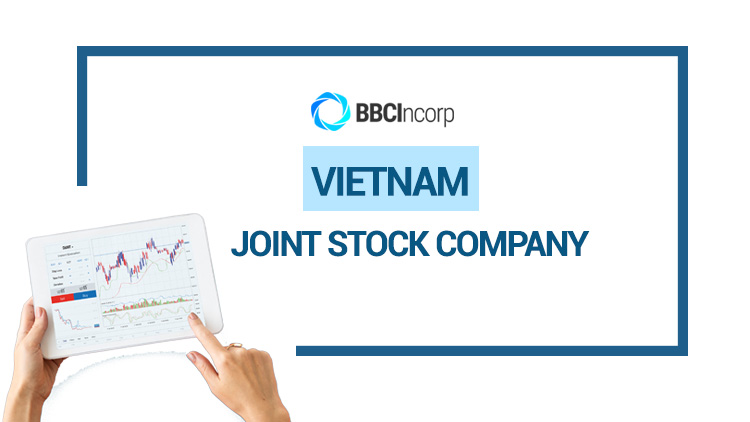
Foreign investors eyeing Vietnam’s potential market and wanting to establish a 100% foreign-owned company can choose either a limited liability company or a joint stock company in Vietnam. In this article, BBCIncorp gives you a comprehensive guide to features and procedures to set up a joint stock company in Vietnam!
1. What is a Joint Stock Company in Vietnam?
A joint stock company (JSC) is a legal entity established by at least three founding shareholders. Shareholders of an JSC can be either individuals or organizations, and they hold a quantity of shares which are divided into equal units to make up the company’s charter capital.
Depending on the share subscription of each shareholder to the joint stock company in Vietnam, these members would be responsible for the company’s debts and liabilities corresponding only to their amount of capital contributed.
It is also worth noting that a Vietnam joint stock company is the only business entity which is entitled to the right of issuing shares under Vietnam regulations and laws.
Like a limited liability company in Vietnam, the JSC can also be registered under two following forms:
- A wholly foreign invested company; or
- A joint venture company.
2. Key feature of a Joint Stock Company in Vietnam
Corporate structure
Pursuant to Article 134, Law on Enterprise 2014 (equivalent to the prescribed provision of Article 137, Law on Enterprise 2020 which comes into force from 2021), a joint stock company in Vietnam is granted two options for its corporate structure:
Model 1: A JSC is structured with the General Meeting of Shareholders, The Board of Directors, the Supervisory Board, and the Director/Director General. Note that the Supervisory Board is required only when the JSC meets two following conditions:
- The number of shareholders in the company is more than 11; and
- The corporate shareholders hold over 50% of the total shares in the company.
Model 2: This simplified corporate structure includes the General Meeting of Shareholders, The Board of Directors, and the Director/Director General. If the JSC decides to follow this model, there are certain criteria that must be met by the Board of Directors:
- At least 20% of the BOD’s members are independent; and
- An Audit Committee must be established under the control of the BOD.
Limited liability of shareholders
Shareholders of a joint stock company in Vietnam are only liable for the financial obligations corresponding to their amount of face value of shares contributed to the company.
To simply put, if you subscribe shares and become an individual shareholder of a Vietnam JSC, you would not experience any loss which surpasses your contributed amount when registering the company.
Raising capital
A limited liability company in Vietnam can raise capital by either its business owner (in case of one-member LTD), or its members increasing their capital contribution or added contributions made by new members (in case of multi-member LTD).
A joint stock company, by contrast, is much more flexible in terms of how to increase the charter capital of the company. In particular, JSCs are allowed to issue different types of shares to raise capital under Vietnam laws and regulations. Some common examples of such methods include:
- Sales of shares to other shareholders;
- Sales of shares to non-shareholders;
- Issuance of shares to the public or on the stock market;
Types of shares in a JSC
There are two popular types of shares which can be owned by a joint stock company in Vietnam: Ordinary shares and Preferred shares.

Ordinary share is the compulsory and most widely-used type of share in most joint stock companies. As per Vietnam laws and regulations, an organization being a corporate shareholder of a JSC and holding no less than 10% of ordinary shares can be entitled to appoint up to 3 authorized representatives.
Preferred shares can also be split up into different types, namely voting preference shares, dividends preference shares, redeemable preference shares and other types of preferred shares as prescribed in the company’s charter and relevant laws on securities. Among those, only authorized entities and founding shareholders are granted the right to own voting preference shares, and this preference is only valid within 3 years from the date of Business Registration Certificate issued.
Be advised that preferred shares can be transmitted into ordinary shares, but not vice versa.
Another must-know feature that makes an JSC become attracted to foreign investors is its high level of flexibility in transfer of shares. Evidentially, shares of a joint stock company in Vietnam can be freely transferred as regulated in Law on Enterprise, except for the case of transferring ordinary shares of founding shareholders to the non-shareholder of the JSC unless otherwise being approved by the General Meeting of Shareholders.
In addition, unlike some other types of business forms restricted with bonds related matters, a joint stock company in Vietnam is allowed to carry on activities of issuing bonds, convertible bonds as well as other bonds as specified by Vietnam laws and the company’s charter.
3. Requirements for setting up a Vietnam Joint Stock Company
As foreign investors, you should take into account some following requirements for setting up a joint stock company in Vietnam:
Naming requirement for a Vietnam JSC
Below are key criteria for an eligible JSC name when incorporating a JSC company in Vietnam:
- The Vietnamese name of an JSC must have two parts: type of company which must be written as “công ty cổ phần” (or its abbreviation as “công ty CP”), and a proper name using Vietnamese alphabet, the letter F, J, Z, W, numbers and symbols;
- The name of an JSC must not be identical or similar to other already existing names; overlap with the name of a state agency or other social organizations without consent for use from such units; or use symbols or words marking contrast to Vietnam culture and customs.
- An JSC’s foreign name in Vietnam should comply with the provision prescribed in Article 40, LoE 2014 (or Article 39, LoE 2020)

Documents required for registering a Vietnam JSC
Foreign investors who wish to establish a Vietnam joint stock company must obtain an Enterprise Registration Certificate (ERC) as stipulated in Vietnam laws. Below are documents that should be included when you send the ERC application:
- Application form for business registration;
- The company charter;
- List of JSC members, including all founding shareholders and shareholders who are foreign investors;
- Copies of identification proof – i.e., ID card, passports (for individual members);
- Copies of establishment decision, business registration certificate, or other equivalent documents (for organizational members), and identification documents of the authorized representative;
- Copies of registration documents of the organizations which have been legalized by the consular (for foreign organizations);
- Investment Registration Certificate (for foreign investors).
4. Vietnam JSCs and post-registration related matters

Business license application. You can be required to obtain additional business licenses to legally incorporate a joint stock company in Vietnam. Note that the business license requirement can vary depending on your business sector of choice.
Payment for registered shares. Shareholders of Vietnam joint stock companies must make full payment for the registered shares during 90 days after the receipt of the ERC. And it is the duty of the Board of Director to ensure the amount and the deadline for the payment of relevant shareholders.
Tax payment. A joint stock company in Vietnam is levied on corporate income tax, business license tax and other forms of tax as regulated under Vietnamese laws.
Particularly, a Vietnam JSC shall be taxed on a standard corporate income tax (CIT) rate of 20% on its earnings generated in Vietnam, except for specific activities involved in oil, gas or precious natural resources related sectors. Key to mention is that Vietnam does adopt tax incentive policies based on location and sector criteria for projects, enabling reduced tax rates with regard to corporate tax on foreign investors doing business in Vietnam.
Other kinds of tax applicable to Vietnam JSCs may include income tax, value added tax or import/export duties. Further information about these types of taxes can be found at Vietnam Tax System
Other compliance duties. After ending every fiscal year, a Vietnam company with foreign investment must submit the annual financial statement which has been audited and approved by the General Meeting of Shareholders to the competent authority.
Furthermore, information including the company’s charter, particulars of Board of Directors, annual financial statements and other related documents are required to publicly disclose on the joint stock company’s website.
Should you have any question regarding setting up a Vietnam joint stock company, do not hesitate to contact us for more information!
Disclaimer: While BBCIncorp strives to make the information on this website as timely and accurate as possible, the information itself is for reference purposes only. You should not substitute the information provided in this article for competent legal advice. Feel free to contact BBCIncorp’s customer services for advice on your specific cases.
Get helpful tips and info from our newsletter!
Stay in the know and be empowered with our strategic how-tos, resources, and guidelines.



